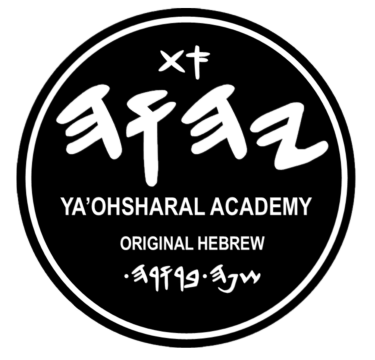

[1] Now, put yourself into a legion, oh daughter of a legion. A siege is there upon us. With a rod will it strike upon the cheek the judge of Ya’oh-shar-al.
[2] And you, Bayth-lakham Aparathah, small to be with the thousands of Ya’ohdah, out from you to me will come forth he to be ruler in Ya’oh-shar-al, and his goings forth are from old, from the days of the ancient past.
COMMENTARY OF MAY’CHAH 5:1-2
[Verse 1] The 1611 Queen James Virus translation renders verse 1, “Now gather thyself in troops, O daughter of troops: he hath laid siege against us.” This heathen translation is asking the reader to accept an awkward, abrupt, and unnecessary grammatical change from the second person (you) to the third person (he). This is easily refuted, and no valid argument can be adduced to support it, when the word sham/שם in this verse is understood to be the adverb “there” and not the verb “he put, he laid,” in the third person and the perfect tense. A siege is a military operation in which enemy forces surround and invade an area, cutting off essential supplies, with the aim of compelling the surrender and the submission of those living inside. It is also an occupation.
The word bath/בת (daughter) is a personifying word, as in ‘daughter of Yaroshalam,’ which means the people related to the Yaroshalam population of old. The bath is also the quintessential expression of her mother. She represents a perfect or typical example of the mother who preceded her. The word “legion” ultimately comes from the Latin legion, meaning “a gathered body of soldiers.” The Ghabaray (Biblical Hebrew) term for a gathered body of troops is gadod/גדוד. Thus, the phrase bath gadod (‘daughter of a legion/troop’) means a gathered body of soldiers related to the great armies of the past because it is the perfection of the great armies that preceded it. The opening clause in verse 1 is talking about an empire with the most astounding military organization the world had ever seen up to that point. Which one?
The prophet May’chah was active during the 8th century BCE when the army of the Neo-Assyrian Empire was the world’s strongest military. In verse 1 of chapter 5 he is telling us, centuries in advance, that his people (our people) would eventually come under siege and experience occupation from a foreign army that would succeed and exceed the Neo-Assyria army in greatness. The prophet May’chah is also telling us that during this foreign occupation of our land, the invading army would strike the shapat Ya’oh-shar-al (the judge of Ya’oh-shar-al) in the face with a rod.
Now we have our detective work cut out for us. The Neo-Assyrian Empire was succeeded by the Neo-Babylonian Empire in the 7th century BCE. Did the prophet May’chah mean that the Neo-Babylonian army would put us under siege, occupy our land, and strike one of our judges in the face with a rod? If he did then he is a false prophet because although the Neo-Babylonians did put us under a siege and they did occupy our land, the Babylonians did not strike a judge of ours in the face with a rod. Neither did the Persians who succeeded the Neo-Babylonians in the 6th century BCE. Neither did the Greeks who succeeded the Persians in the 4th century BCE. The prophet’s words can only be describing the Roman Empire which succeeded the Greeks in the 2nd century BCE.
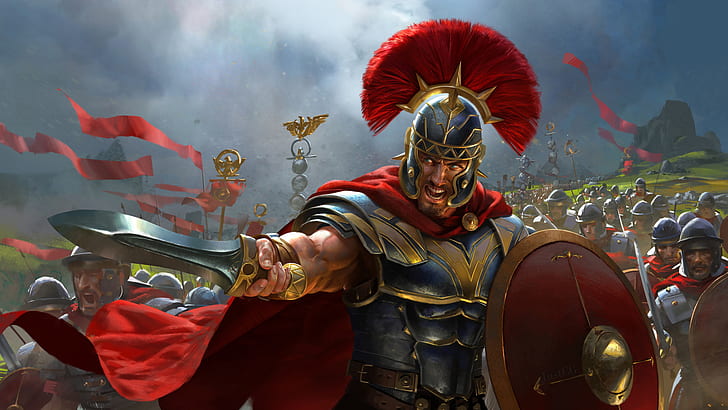
In the ancient world the most powerful military was the Roman military. The Roman army was the bath (daughter) of the world’s triumphant militaries of the past, having learned from and having mastered the tactics, maneuvers, and the strategies of the older militaristic empires that preceded it, i.e. Assyria, Babylonia, Persia, and Greece. The military of Rome was the biggest, the most successful, and the most unkind force in ancient history. Its strength was one of the main reasons that Rome became so powerful. The Roman army was divided into legions, each comprising about 4,800 infantry and 120 cavalry. A legion was subdivided into 10 cohorts, comprising 480 men apiece, and each cohort was subdivided into six centuries comprising 80 men apiece—not 100 as the name “century” suggests.

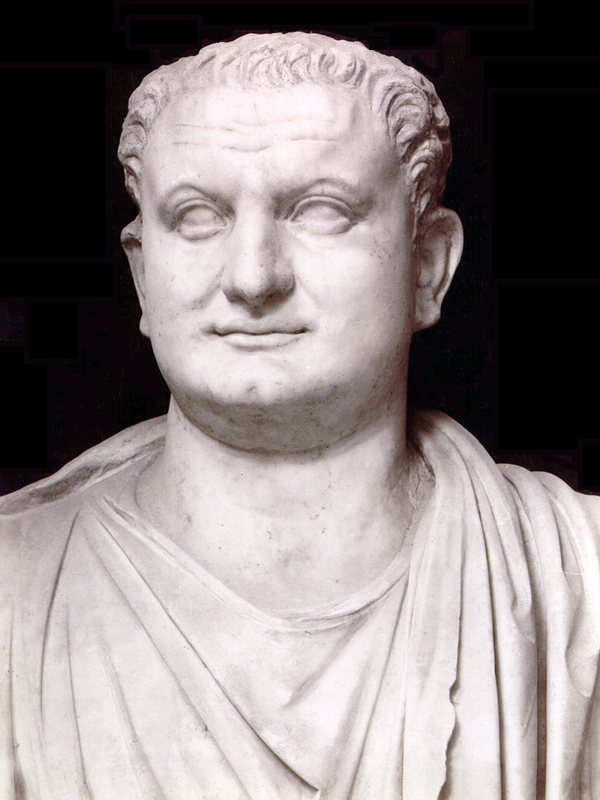
In other words, the siege that May’chah the prophet prophesied about in verse 1 is the siege that began in 63 BCE when the Roman general Pompey conquered Yaroshalam (Jerusalem). The occupation ended in 70 CE when the Roman general Titus destroyed Yaroshalam, terminated our Commonwealth, and scattered our people from their homeland. This means that the shapat (judge) who is to be struck in the face with a rod by the invading army has to be one of our own people who appeared in our land between 63 BCE and 70 CE. Who was he?
“And they were the ones spitting to him in his face, and they were the ones who took the rod and struck his head” (Mathath-Ya’oh 27:30).
[Verse 2] The answer to my question, “who was he?” is given in May’chah 5:2. The prophet May’chah tells us that the shapat will be moshal/מושל (ruler) from the town of Bayth-lakham (Bethlehem) which means this man is of royal descent, because Bayth-lakham was the city of King Do’ayd (David). The prophet May’chah was not talking about King Do’ayd but about a man who would be a direct descendant of King Do’ayd. This is beyond dispute. There is no ambiguity here whatever.
However, the problem becomes when heathen Christians explain this verse and wrench it out of context to say that their idol Jesus Christ is the moshal but also the Almighty Himself, which is sheer stupidity. The prophet May’chah does say the moshal is from the days of ancient past, so we are to understand from this that the moshal existed prior to his birth in the town of Bayth-lakham, but the prophet also says the moshal has goings forth. This clearly means he has a beginning. His beginning was admittedly a very long time ago according to the prophet, but it was still a beginning nonetheless. That excludes all possibility that the moshal of May’chah 5:2 is the Almighty. The Almighty has no beginning.
The moshal of May’chah 5:2 is a messenger from heaven who became a human being. He is before King Do’ayd but he becomes a direct descendant of King Do’ayd when he is begotten by a man from King Do’ayd’s patrilineal lineage in the town of Bayth-lakham during the period of the Roman occupation. He is not born in the city of Yaroshalam but rather in lowly Bayth-lakham because the city of Yaroshalam won’t be ruled by the House of Do’ayd when the moshal is born. The nation of Ya’oh-shar-al will have come under siege and the House of Do’ayd will have lost the throne and become marginalized. That is the situation when the moshal is born.
All of this is fairly straight forward, but because the Greek gospel books were penned by misinformed heathens, heathens who never met the man they describe, these books exaggerate and twist the truth about him and give you a lie. There is not a fat chance in hell that May’chah the prophet believed that a ruler of Ya’oh-shar-al could come from the royal bloodline, from the city whence the royal family sprang, and not be a direct patrilineal descendant of King Do’ayd but only a maternal descendant of his. That’s nonsense. The truth is that a man of Ya’oh-shar-al descent who could trace his paternal lineage back to King Do’ayd conceived a male child with his wife in his town of Bayth-lakham, but the consciousness inside the brain of that human infant was that of an angelic being from above.
Let any reader scoffing at what I just said about the consciousness of an angel being downloaded into the blank brain of a human infant also scoff at billionaire Tesla and SpaceX CEO Elon Musk who says that humanity is on course to be able to digitally copy the human brain’s structure and download the conscious mind into a computer. Existing technologies already allow us to store unimaginable amounts of data and to run gargantuan simulations with that data. Therefore, it is only a matter of time before technology becomes advanced enough that a person’s brain can be scanned, and exactly how the billions of the brain’s neurons are connected to each other can be measured, and then a copy of that pattern can be downloaded into an artificial brain. If man with limited intelligence is on the verge of uploading and downloading consciousness do not bother telling me that the Creator of heaven and earth, the Supreme Being with supreme intelligence who designed the human brain with its billions of neurons, is not up on game. He is in fact way ahead of the game.

[3] Therefore, he will give them up until the time that the one in labor has given birth, even the excellency of his brothers. They will restore upon the sons of Ya’oh-shar-al.
[4] And he will stand and feed in the strength of YA’OH, in the majesty of the name YA’OH, his Alah’aym; and they will dwell, for now will he be great until the ends of the earth.
[Verse 3] Lachan/לכן (Therefore); i.e. because the moshal is in reality a man from heaven born into the royal family of Do’ayd, impoverished due to the nation’s sins, and because the moshal was humiliated and set at naught by the army of the foreign occupiers, and they would not have been able to humiliate him where it not because of the nation’s sins, the moshal will give them up (Mathath-Ya’oh 23:38). The 3rd person masculine plural suffix attached to the end of the verb yathanam/יתּנם (he will give them up) points to the nation of Ya’oh-shar-al/ישׂראל in verse 1; and nathan/נתן is applied to the abandoning of the nation of Ya’oh-shar-al into the power of its enemies as a punishment for its sins. Notice that the moshal is not saving anyone from sin. He is abandoning his own people and leaving them to their fate because of their sin. Thus, the Christian doctrine that Christ came to die for the sins of his nation and for the whole world is an anathema and has absolutely no place here whatsoever.
The nation is to be left abandoned until the time that the woman in labor, who is the nation, gives birth. That is, until the daughter of Tsayon (Zion), i.e. the nation of the twelve tribes of Ya’oh-shar-al plus Lo’ay collectively compared here to a pregnant woman, shall be delivered out of captivity in the last days. The child that the woman Tsayon gives birth to is the remnant community who makes an Exodus from the land of pyramids in the west to the wilderness archipelago in the far east, and this remnant will have a leader according May’chah 2:13. Their leader is the yathar/יתר (excellency) of the brothers of the moshal. The heathen translations render the masculine singular noun yathar as “remnant” in this verse, assuming it to be a collective noun, but verse 4 rules this out. The supposition that the remnant is personified in verse 3, is precluded not only by verse 4 but also by the fact that in the very same sentence the sons of Ya’oh-shar-al are spoken of in the plural. The word normally used for remnant is sha’arayth/שארית, and this is the word used in verses 7-8 below.
When we think of the English word “excellency” we automatically think of an honorific style given to certain high-level officers of a sovereign state. The president and the vice-president, cabinet ministers, ambassadors, and some other high-ranking bureaucrats are addressed as Excellency. The Midianite in-law of Mashah (Moses) was named Yatharo (his excellency). The leader of the Exodus remnant in the last days is also their malach (king) according to May’chah 2:13, and this explains why the prophet May’chah refers to him as yathar in verse 3. The yathar stands out among the brothers of the moshal in the last days. Together they will bring restoration to the nation in the wilderness.
[Verse 4] Like the moshal, the yathar his brother is nothing more than a subordinate to YA’OH. The moshal is a man from heaven who became a man from the royal House of Do’ayd, and one day he will sit upon Do’ayd’s throne in Yaroshalam after the tribes have left the wilderness and reclaimed the promised land. The yathar, on the other hand, is a man from earth who will stand with an assurance given to him by YA’OH, uniting the dignity of a king with the tenderness of a shepherd’s care, and he will feed the remnant while they are in the wilderness, before they reclaim the promised land. He will feed the tribes in the majesty of the name YA’OH because the yathar is the servant who YA’OH raised up in the north, and relocated him to the far east, and then used him to bring His holy name back into the light from the east as prophesied in Yashai-Ya’oh 41:25.
They will dwell, i.e. abide and remain undisturbed in the wilderness, just as sheep abide and remain safe and secure under the watchful eye of a capable shepherd.
For now will he be great until the ends of the earth. The subject of this clause is still the yathar, the man who is leading the congregation of the redeemed remnant in the wilderness. Because he is the same man who is nicknamed Chorash (Oh furnace, smash!) by YA’OH in Yashai-Ya’oh 45:1-5, and because he is charged with making the name YA’OH known all over the world from the rising of the sun and from the west as per Yashai-Ya’oh 45:6, he will be great.

[5] And this man will be the shalom. Ashor, when he will come into our land, and when he will tread in our palaces, then we will cause to be raised against him seven shepherds, even eight principal men.
[6] And they will lay waste the land of Ashor by the sword, even the land of Namarad at the entrances thereof, and He will deliver us from Ashor when he comes into our land, and when he treads in our borders.
COMMENTARY OF MAY’CHAH 5:5-6
[Verse 5] And this man will be the shalom, i.e. the yathar of verse 3 will be the shalom that the people who return to the promised land need when they come under attack in the promised land. The word of YA’OH came to prophet May’chah in the days of the kings Ya’ohtham (756-741 BCE), Akhaz (741-726 BCE), and Khazak-Ya’oh (726-698 BCE) of Ya’ohdah according to May’chah 1:1. This means May’chah was an eyewitness of the Assyrian invasion of our land in the 8th century BCE when Tiglath-pileser III (745-726 BCE), Shalmaneser V (726-721 BCE), Sargon II (721-705 BCE), and Sennacherib (705-681 BCE) were the kings of Assyria. Thus, having already witnessed invasions by Ashor, the prophet May’chah is predicting a future invasion by another enemy whom he calls “Ashor” by way of analogy only. The yathar of verse 3 is still active when this future invasion from the north will take place, and he will be the leader of the resistance on the ground.
The shabaihh rai’aym/שבעה רעים (seven shepherds) answers to the seven women in Yashai-Ya’oh 4:1, and the seven trees in Yashai-Ya’oh 41:19, and the seven candle branches of the manarah in Zachar-Ya’oh 4:1-14. These are all the same thing. They are the seven assemblies of Ya’oh-shar-al made up of two tribes each except for the set apart tribe of Lo’ay. One assembly is the tribe of Gad and the tribe of Yashshachar; one assembly is the tribe of Ashar and the tribe of Dan; one assembly is the tribe of Zabalon and the tribe of Napathalay; one assembly is the tribe of Aparaym and the tribe of Manashah; one assembly is the tribe of Ra’oban and the tribe of Shamai’on; one assembly is the tribe of Ya’ohdah and the tribe of Ban-yamayn; and one assembly is just the tribe of Lo’ay unto itself. Each of the seven assemblies will be under the command of a single shepherd general. The eighth man is the leader of the seven shepherds. He is the yathar of verse 3 and also the galah (‘bowl fountain reservoir’) in the vision of the prophet Zachar-Ya’oh suspended over the golden manarah (Zachar-Ya’oh 4:2).
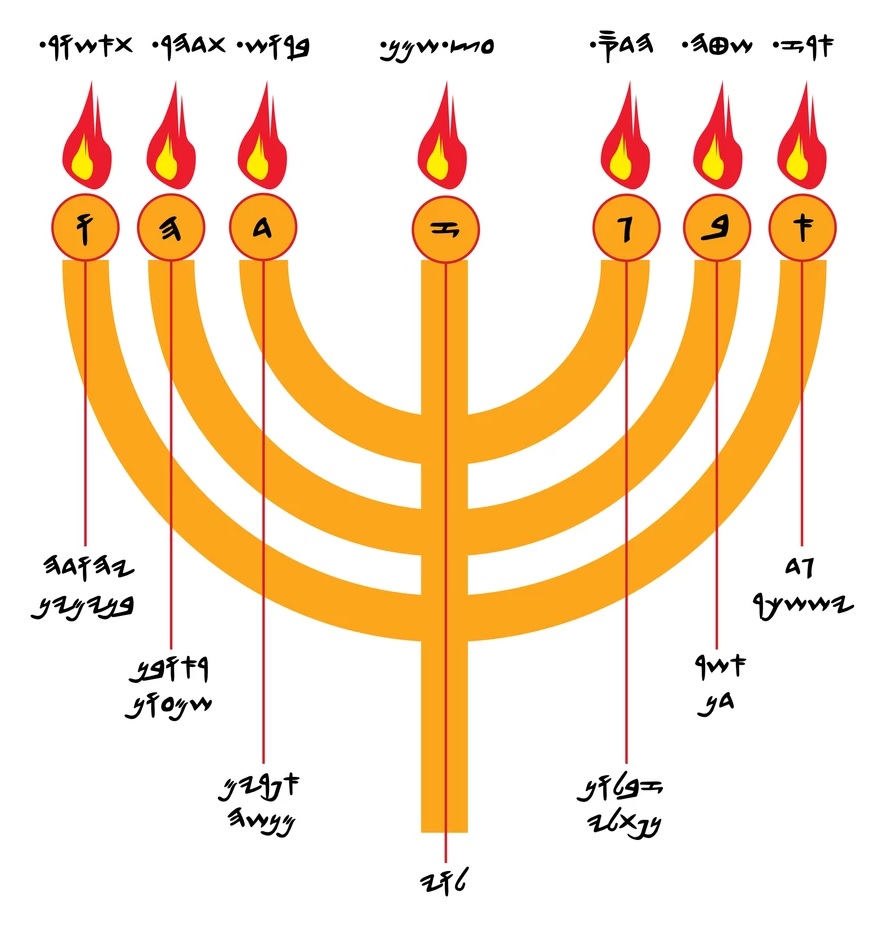
The picture shows a complete restoration of the nation and all of its 13 tribes, and the tabernacle of YA’OH, wherein the golden manarah is to be placed, is with them. The restoration will take place in the wilderness islands of the east (Yashai-Ya’oh 41:1-2), and afterwards the people who have been glorified by YA’OH in the wilderness will leave in ships, with their gold and with their silver, and go reclaim the promised land (Yashai-Ya’oh 60:9).
[Verse 6] There was never any place called “the land of Namarad” (aka Nimrod) and this is another clue that the mention of Ashor (Assyria) in verses 5 and 6 is symbolic. Ashor is named as the type of the nation of Ya’oh-shar-al’s deadliest foe, even deadlier than the literal Ashor which then was threatening the kingdom of Ya’ohdah in May’chah the prophet’s lifetime in the 8th century BCE. The name Namarad is a verb in the 1st person common plural and in the imperfect tense. It means “we will rebel,” from the verbal root marad/מרד (rebel). When the tribes of Ya’oh-shar-al leave the wilderness and return to reclaim the promised land, they will have a few years of rest in the land and then an enemy from the north will attack and invade their land. This is Gog and his confederation of nations (Ya’oh-khazak-al 38-39). The prophet May’chah calls the future enemy by the name “Ashor” from the “land of Namarad” because Gog and his armies will attack us from the north and they will be in rebellion against YA’OH. The yathar and the seven shepherds will wage war with Gog and his armies, and there will be casualties on our side, but we will be victorious in the end, and destroy the enemy. We will even take the fight into enemy territory. We shall overcome the entry points of their land and run the place down. YA’OH, He will be seen over us (Zachar-Ya’oh 9:14), and He will deliver us!
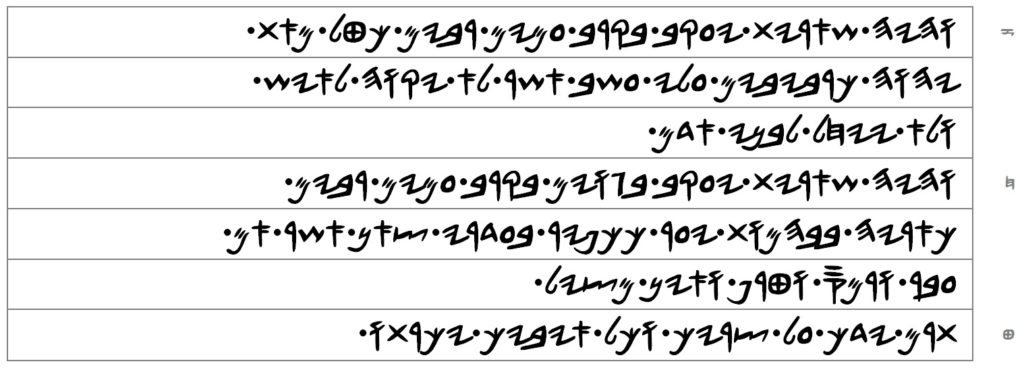
[7] And the remnant of Ya’oh-ghakab will be in the midst of many nations like the dew from YA’OH, like the showers upon the grass which does not wait for man, and not will it hope for the sons of man.
[8] And the remnant of Ya’oh-ghakab will be among the heathens in the midst of many nations like a lion among the beasts of the wooded forest heights, like a young lion among flocks of sheep, who, if he passes by, then he tramples down and rips apart, and there is no deliverer.
[9] You will lift up your hand upon your opponents, and all of your enemies will be cut off.
COMMENTARY OF MAY’CHAH 5:7-9
[Verse 7] Morning dew and light rain showers upon the grass is only there for a short time and then its gone. It’s a blessing but it doesn’t wait around for anyone. It has its own schedule to keep, and it is not sitting and hoping that man sees it and appreciates it before its gone. This is what the remnant of Ya’oh-shar-al will be like in the second wilderness. They will be among the heathens only for a short period. A time, times, and a half (ninety-eight years) may seem like a long time to you and me, but it is really the blink of an eye compared to how long our people have been in exile since 70 CE. Nations will have to see our light and repent and come join us if they want to be saved, because the dew from YA’OH wont be sending out any missionaries hoping to proselytize them. This aint no Christian church trying to save souls for Jesus.
[Verses 8-9] The remnant of Ya’oh-shar-al will be living in the yair/יער (wooded heights), also stated again by the same prophet in chapter 7 and verse 14. This is located way up high in the mountains in the wilderness of the sea in the east. This is also where they will have their city Yaroshalam and where they will build the tabernacle of YA’OH. They will be like a lion among timid beasts and among sheep with no one to protect them. All of the nations of the world who had a hand in their oppression will be trampled upon and ripped apart by their sword, and their sword is violent weather and cataclysmic meteorological phenomena (Khazon 11:6). They will not leave their abode in the wilderness in order to destroy nations. Instead, they will call down death from above. They will do it remotely.
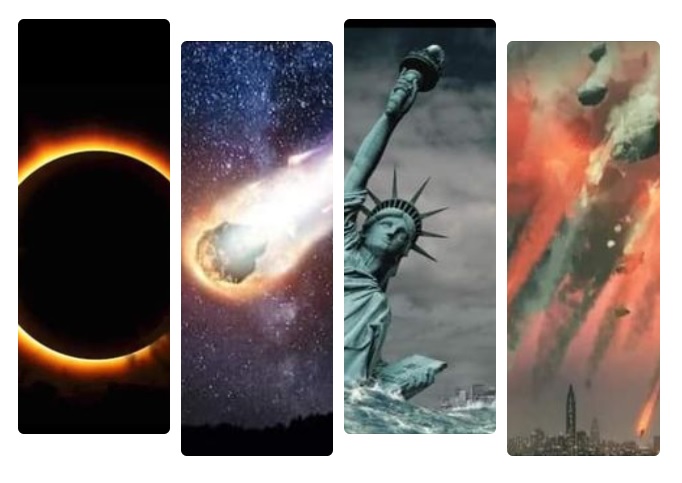
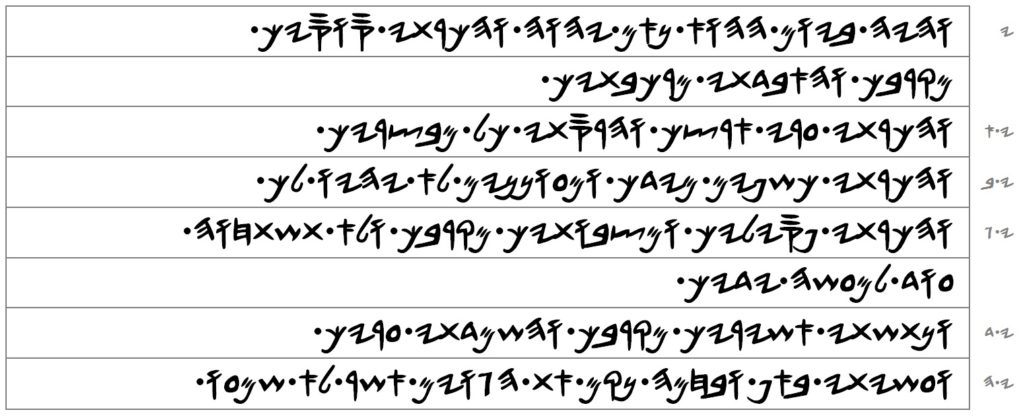
[10] And it will happen in that day, says YA’OH, that I will cut off your horses from out of the midst of you, and I will perish your chariots.
[11] And I will cut off the cities of your land, and I will cause to be thrown down all your strong holds.
[12] And I will cut off sorceries from out of your hand and soothsayers not will there be for you.
[13] And I will cut off your idols, and your standing images from out of the midst of you, and not will you worship again the work of your hands.
[14] And I will pluck up your groves from out of the midst of you, and I will cause to be destroyed your cities.
[15] And I will do wrath and violent fury to the heathens which they have not heard.
COMMENTARY OF MAY’CHAH 5:10-15
[Verse 10] At first glance it may seem as if the threat in verse 10, and in the verses that follow, is being directed towards the remnant of Ya’oh-shar-al. However, the previous verses talk about how the remnant would be the instrument of destruction in the hand of YA’OH, and verse 15 explicitly tells us that heathen nations are the targets of this destruction. Therefore, when the prophet says in the name of YA’OH that He will cut off and perish sosa’aycha/סוסיך (your horses) and marchabathaycha/מרכבתיך (your chariots), the prophet is talking about the horses and chariots of the heathen nations who are enemies of Ya’oh-shar-al.
[Verse 11] All the cities of the heathen lands will fall, and all of their strong holds (military bases) will be destroyed.
[Verse 12] The word for sorceries also answers to science and technology. Many of the things we take for granted today would be considered magic and sorcery only a few centuries ago. The heathen nations will not have a technological upper hand and none of their soothsayers (scientists) will be able to save them. They will all be destroyed.
[Verses 13-14] YA’OH will destroy all false religions. All of them are going bye bye in every city where they exist because their cities will all be destroyed. He will exterminate every form and every vestige of heathen idolatry in the world and make His own name to be great.
[Verse 15] The wrath and violent fury of YA’OH is going to be poured out upon the nations of the world while the remnant is in the wilderness. This is one reason why YA’OH is bringing His remnant to the wilderness. They will be protected there while the rest of the world is plunged into chaos and mass destruction. The wonders will endure for a time, times, and a half while the dew of YA’OH is on the grass in the second wilderness.
The Exodus to the second wilderness in the east, to the place of the name YA’OH, is already underway and we rejoice to see and to witness with our own eyes how YA’OH is fulfilling the words of His prophets. This current Year 7252 is the shamatah year (release year). It is the acceptable year of YA’OH (Yashai-Ya’oh 61:2) that I have proclaimed in His name. The following Year 7253 will be the beginning of the day of the vengeance of our Alah’aym. I tell you what He has told me.
His name is YA’OH
Always has been. Always will be.
#EXODUS2023
1.15.7252 (April 5, 2023)
